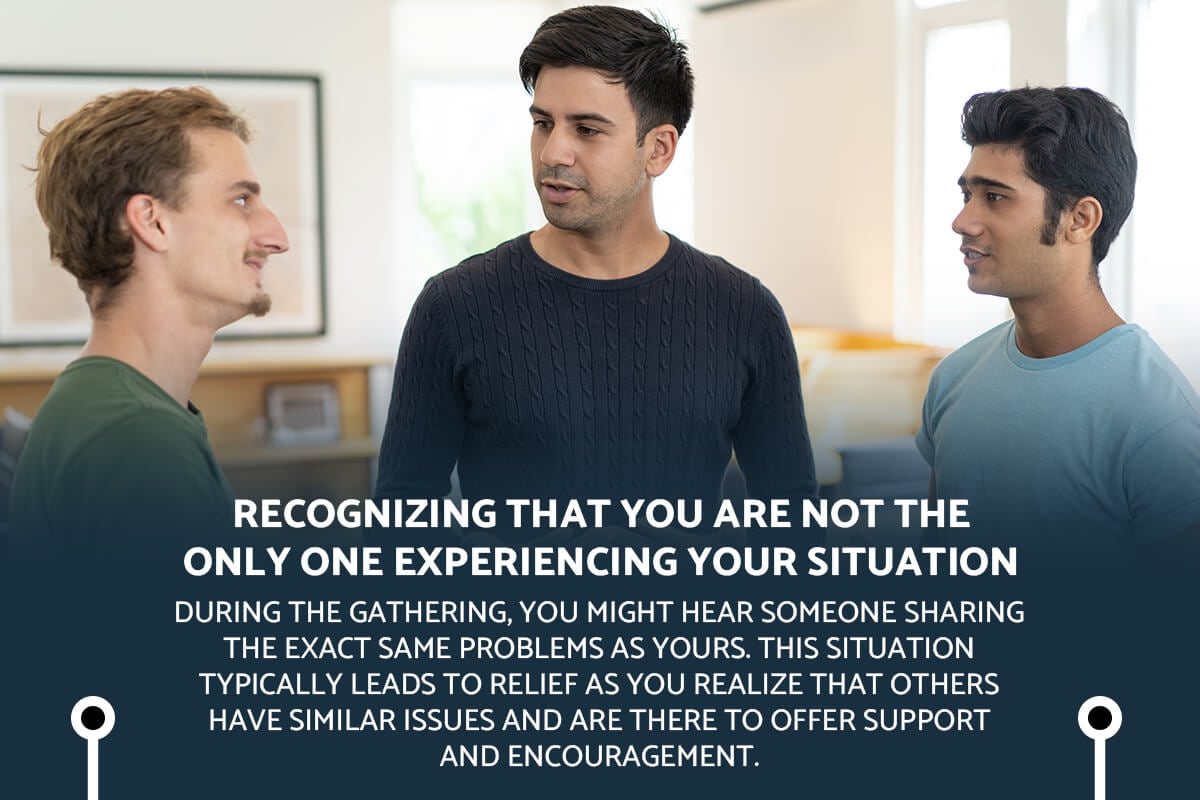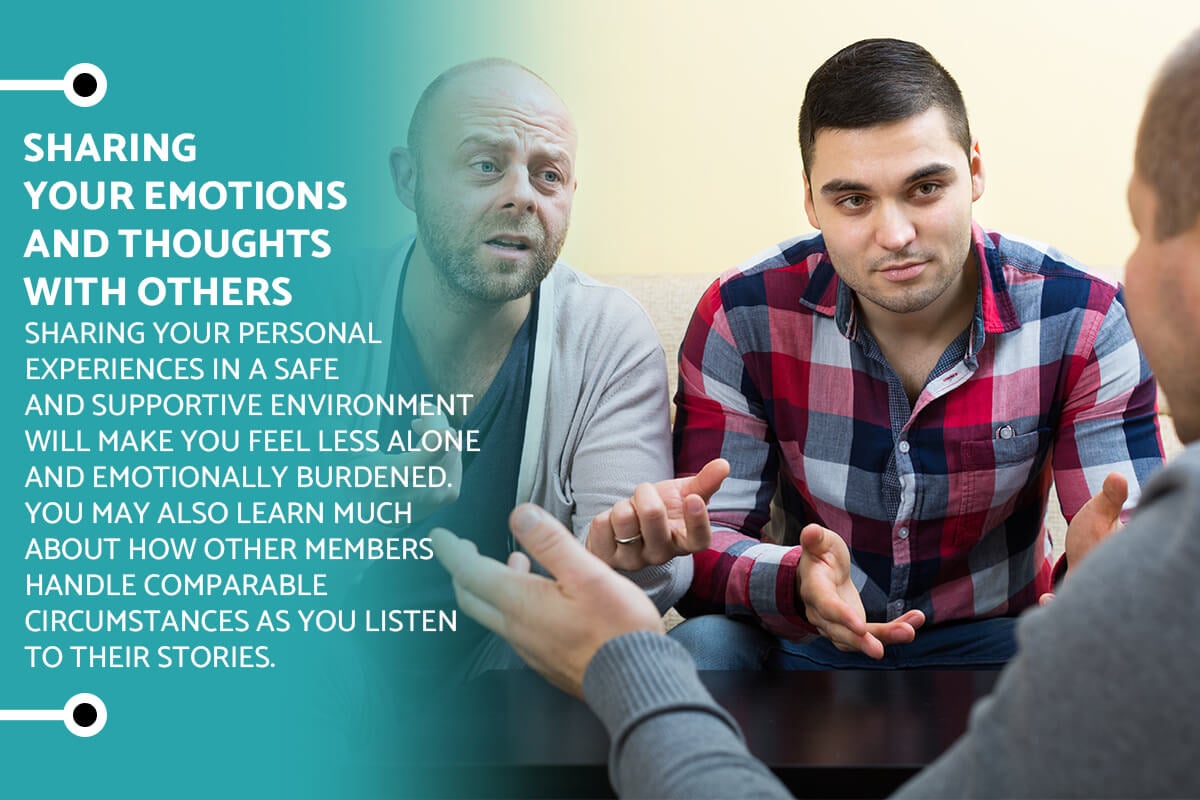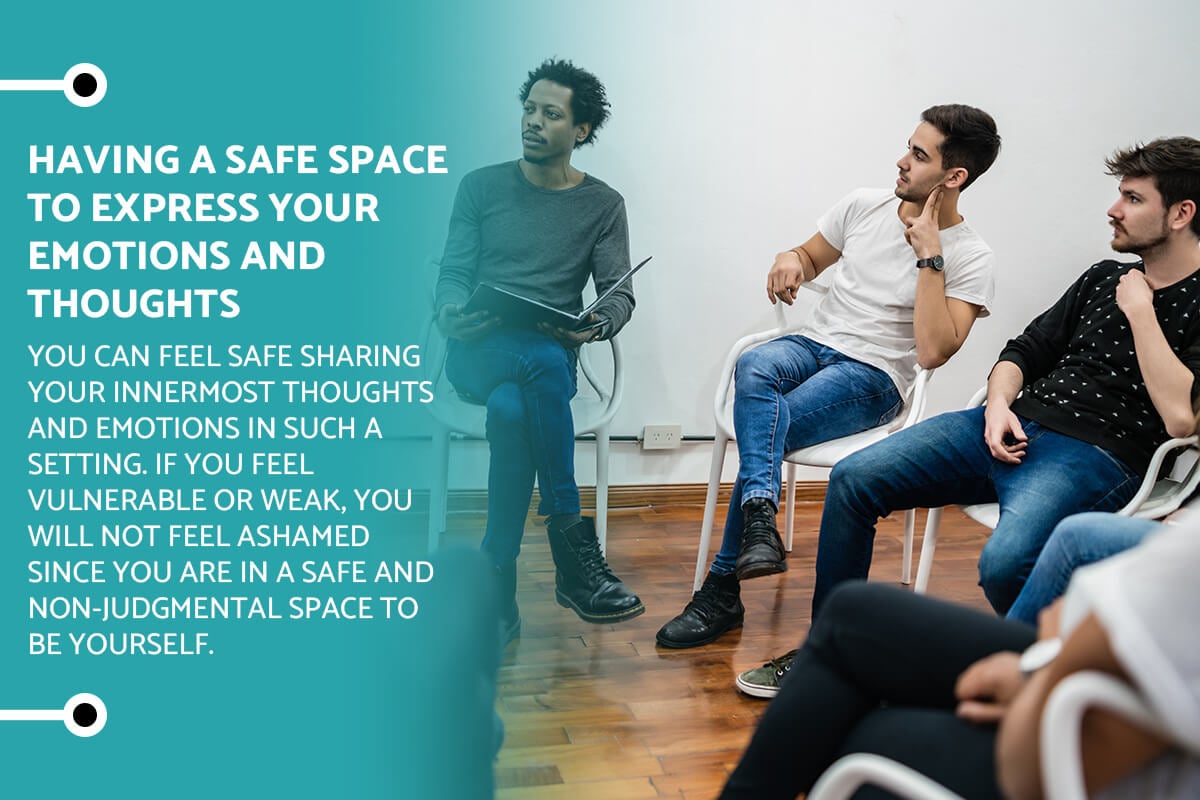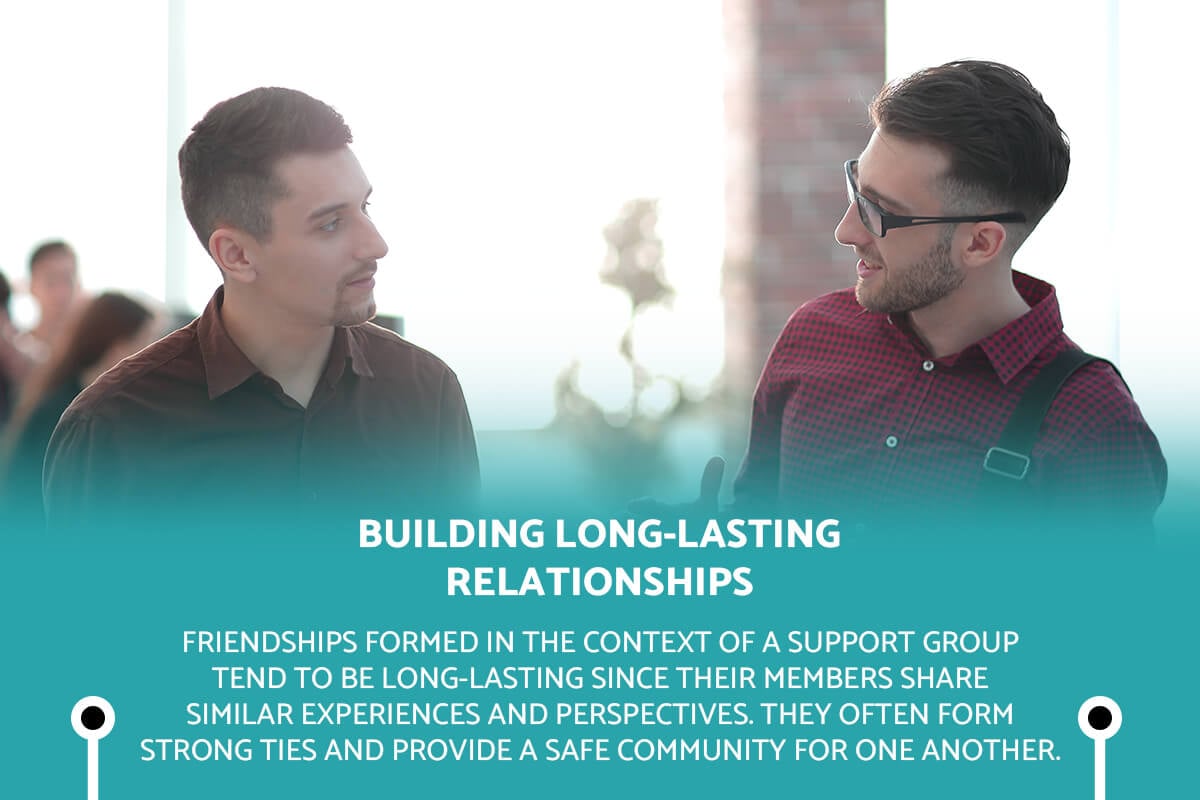If you feel alone when dealing with a health issue or life crisis, talking to other people who have been through similar situations can be a great relief. This certain measure is one of the many benefits of support groups.
There are many other ways support groups can help you as you walk through your healing journey. Here are 12 reasons to consider:

Recognizing That You Are Not the Only One Experiencing Your Situation
Human connection is an important part of life. Joining a support group may not only make you feel less isolated, but it may help enhance your mental, emotional, and physical health after facing difficulties. During the gathering, you might hear someone sharing the exact same problems as yours. This situation typically leads to relief as you realize that others have similar issues and are there to offer support and encouragement.

Sharing Your Emotions and Thoughts With Others
Support groups allow you to express yourself and learn proper communication, such as open sharing and active listening techniques. Sharing your personal experiences in a safe and supportive environment will make you feel less alone and emotionally burdened. You may also learn much about how other members handle comparable circumstances as you listen to their stories.
When you discover that the other participants will listen to you without passing judgment and will commend you for your courage to share your thoughts and emotions, it may give you a therapeutic and healing experience. At the same time, you will feel empowered to provide support and empathize with other group members.

Acquiring Useful Knowledge and Resources
Support groups provide information and general guidance on dealing with a particular condition or situation, such as addiction, grief, or domestic violence. It encourages participants to share their knowledge and experiences freely. As a result, you discover new methods of coping strategies, their advantages, and disadvantages, and hear other people’s feedback on these methods. Researching relevant resources about your condition may also inspire you, give you a sense of control over your circumstances, and empower you on your recovery journey.

Call Design for Recovery to Begin Your Healing Journey!
Reach out to our team to discuss sober living options and next steps toward a healthier routine.
Enhancing Your Ability to Interact With Others
In a support group, you learn to practice good communication skills through group activities and training that promote teamwork and effective communication. Meeting with and talking to others who understand your situation also helps improve your social skills. At the same time, you become more willing to open up and be honest about your condition because you have someone to relate to. Taking turns sharing and actively listening to one another will make you feel more comfortable sharing your story.

Feeling More Optimistic About the Future
A support group encourages members to set realistic life goals and celebrate achievements. It provides resources to teach members how to plan their future.
During group meetings, as you hear other people’s stories about where they have been and how far they have come, you will become more optimistic that you, too, can get there one day. Indeed, it is powerful to witness people who are further down their road to recovery and have made significant gains in their lives. These inspiring people give you hope for the future by demonstrating that healing is attainable. Being with these people who have made substantial progress toward leading healthier lives will inspire you to do the same.

Decreasing Your Emotional Burden
Attending support groups may help you work through your emotions. Over time, you will feel less anxious and uncomfortable since the group allows you to share your emotions in a safe and non-judgmental space. You may find that your general level of distress and emotional burden decreases as you and the group work through various self-care practices and coping techniques to manage triggers and difficult emotions. This is a good indicator that you are making progress and that your recovery is making headway.

Developing a Deeper Understanding of Yourself
A support group provides activities and resources that promote self-discovery and personal growth. When you figure out how to deal with challenges, you gain insight into who you are and how you behave. If you take the time to learn more about yourself and reflect on your experiences, you’ll be more equipped to achieve your recovery goals.
Understanding your own needs and individuality comes with practicing healthy coping skills. You may learn more about the causes of your problems and the methods that have proven most effective in guiding you toward your goals.

Contact Design for Recovery Today!
Fill out our quick form to connect with a peer mentor and learn how our sober living community supports accountability, structure, and personal growth in recovery.
Contributing to the Well-being of Others in the Group
A common theme in the stated goals of various support groups is providing help and support to those in need. In the same way that you gain from being part of a group, you can contribute to the personal growth of other group members. Hearing about your accomplishments and seeing how supportive and encouraging you are will greatly impact the lives of those around you. When you can assist another person, you will feel better about yourself.
Moreover, a support group frequently allows its members to participate in volunteer work or contribute positively to their communities. It empowers members with the tools and resources necessary to establish and maintain healthy relationships with other people.

Accessing a Cost-effective Form of Support
A support group also has the benefit of being inexpensive. Many in-person and online support groups are free, while some groups charge a reasonable price. However, support groups are usually less expensive than individual therapy sessions. Some support groups also lobby for funding from government agencies or local organizations to continue providing free support group services to those in need.

Gaining Insights Into Your Condition or Challenges
Most support groups routinely invite experts in the field to speak on relevant topics. They provide members with educational materials to gain insights into their condition or crisis. A support group leader motivates participants to teach and learn from one another. Through this, you will have the knowledge and abilities to care for yourself in any situation.

Having a Safe Space to Express Your Emotions and Thoughts
Support group members develop ground rules to maintain respect and confidentiality among themselves. They are highly encouraged to be open and honest with one another.
Support group participation enables you to connect with others who understand what you’re going through. You won’t feel criticized while talking to someone who understands how you feel because they are going through similar challenges. You can feel safe sharing your innermost thoughts and emotions in such a setting. If you feel vulnerable or weak, you will not feel ashamed since you are in a safe and non-judgmental space to be yourself.

Building Long-Lasting Relationships
It is common for support group members to bond with one another and become reliable friends in the long run. Friendships formed in the context of a support group tend to be long-lasting since their members share similar experiences and perspectives. They often form strong ties and provide a safe community for one another.
If you or a loved one is in search of a support group to help with their emotional well-being, Design for Recovery is here to help. Call us at (424-327-4614) to learn more.
Addiction, mental illness, and life crises can be emotionally draining. Thus, first-time support group attendees often feel anxious about finding the right support group and avoiding a problematic support group. It’s also normal if you do not feel comfortable participating in the conversation during the first few meetings. However, you may also consider joining a different support group format if you don’t think the first one suits you. It is best to conduct online research about the advantages of this group therapy and the personal stories of participants from other groups.
Face-to-face meetings are the most effective format for support group participation. On the other hand, the demand for virtual assistance has led to the rise of online groups, which offer the advantage of flexible attendance. To get the most out of the group, you should try to attend regularly until you adjust to the new group.
For more support group information, you may ask referrals from a doctor, hospital, or non-profit organization. You may also browse through health websites such as the National Institutes of Health and Mental Health America. A friend or family member may be able to recommend other support groups. If you are still hesitant about joining a new support group, you may ask your treatment provider about other options, such as counseling, outpatient therapy, and sober living homes.
Design for Recovery sober living homes offer a safe and structured environment where residents can learn essential life skills to help them transition from residential treatment to regular life. Residents in our sober living have access to 12-step meetings, a sober support system, and programs such as mentoring and family services. Contact us to learn more about our sober living programs.
- Recognizing That You Are Not the Only One Experiencing Your Situation
- Sharing Your Emotions and Thoughts With Others
- Acquiring Useful Knowledge and Resources
- Enhancing Your Ability to Interact With Others
- Feeling More Optimistic About the Future
- Decreasing Your Emotional Burden
- Developing a Deeper Understanding of Yourself
- Contributing to the Well-being of Others in the Group
- Accessing a Cost-effective Form of Support
- Gaining Insights Into Your Condition or Challenges
- Having a Safe Space to Express Your Emotions and Thoughts
- Building Long-Lasting Relationships
Begin Lasting Sobriety Now!
Frequently Asked Questions
A successful support group can maintain a level of consistency while still being meaningful, interesting, and engaging to the members of the group. A support group is successful if you are able to speak freely and honestly about your feelings, acquire new coping skills to deal with difficult situations, maintain the motivation necessary to effectively manage your condition, and acquire a sense of empowerment and hope. A successful support group must also demonstrate clear guidelines and positive feedback or recovery rates.
According to research, self-efficacy is one of the most important factors that peer support groups greatly impact. There are many other benefits to participating in a peer support group, including increased knowledge of your condition and the opportunity to help others with their struggles. It also enhances leadership skills and mutual respect, sets healthy boundaries, and develops self-esteem. Support groups help you feel less isolated after realizing you have acquaintances and friends to help you cope with your condition.
The importance of an emotional support group is effectively learning how to deal with and release emotional burdens and move forward with learned coping strategies. It will help you learn how to open up about your own experiences with challenges and build a sense of community with other members who go through similar situations.
A support group allows individuals to share their personal experiences and emotions, coping strategies, and firsthand knowledge about certain conditions and treatments.
A health-related support group (like cancer support groups) may bridge the gap between health care and the need for emotional support. An individual’s family and mental health professional may not be able to fully comprehend the emotional and psychological toll that a serious condition might take. In that case, a support group of individuals with similar experiences may serve as the person’s emotional and mental backbone.
Having social support from friends and family members helps lessen the effects of stress and mental health issues. While self-reliance has benefits, maintaining emotional and physical well-being requires the moral support of people who can be relied on in times of challenges. Having people around you who care about you helps you feel less isolated and gives you the drive to engage with the outside world. Better mental health, increased resilience, and a longer, healthier life are just some of the many advantages of having support.
You may have pondered the potential challenges of launching a peer-led support group. Surprisingly, there are almost no conditions necessary. As long as the support group’s structure ensures everyone’s safety, confidentiality, and respect, you can set up one. While some groups meet to exchange useful information and words of encouragement, others develop into long-term mutual support communities where members regularly assist one another with tasks such as carpooling and child care.
Most people who join various types of support groups do so to express themselves, receive feedback, and learn from those who have been through similar experiences. You should also consider who could be interested in joining your support group. You may ask your friends whether they know anyone interested in joining and request that they spread the word about your group. You may also use more traditional methods, such as posting flyers in public places and running ads in the local paper or on community bulletin boards. Advertising via the Internet is another effective method of promoting your support group. Furthermore, here are the important details you need to work out before launching a support group:
- What are the support group guidelines?
- How often should the support group meet?
- Where should the gathering be held? Is it an online support group, or should meetings be held in a community center or clinic?
- If online, how should people get in touch with one another? Is it through Zoom and FaceTime?
- To what age range are you providing support?
- How long do these gatherings typically last?
- Do you plan to take charge of the group’s meetings yourself or look for other support group leaders to do so?
- Is this an open or closed support group meeting? Is it possible to join the group once it has already begun?
- To what extent are new members accepted?
- Which is preferable, a large group or a small one?
You’ll be ready to start your first meeting as soon as you’ve figured out the answers to these support group details.
A support group is a gathering of individuals who share common interests and work together to help each other develop personally. People can express their emotions and receive helpful advice from those who have been through similar experiences. Participants in a support group share strategies for coping with their issues and bond with one another due to their shared experiences. There are many ways that support groups meet, such as in-person gatherings, teleconferences, or online communities.
- Tracy, K., & Wallace, S. P. (2016). Benefits of peer support groups in the treatment of addiction. Substance abuse and rehabilitation, 7, 143–154. https://doi.org/10.2147/SAR.S81535







Written By
David Beasley